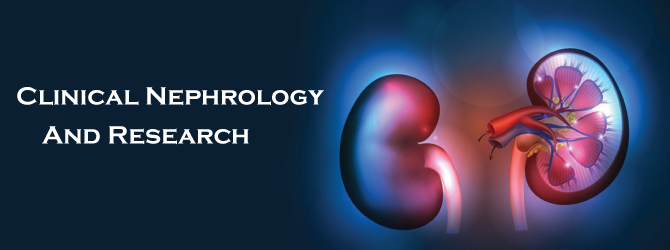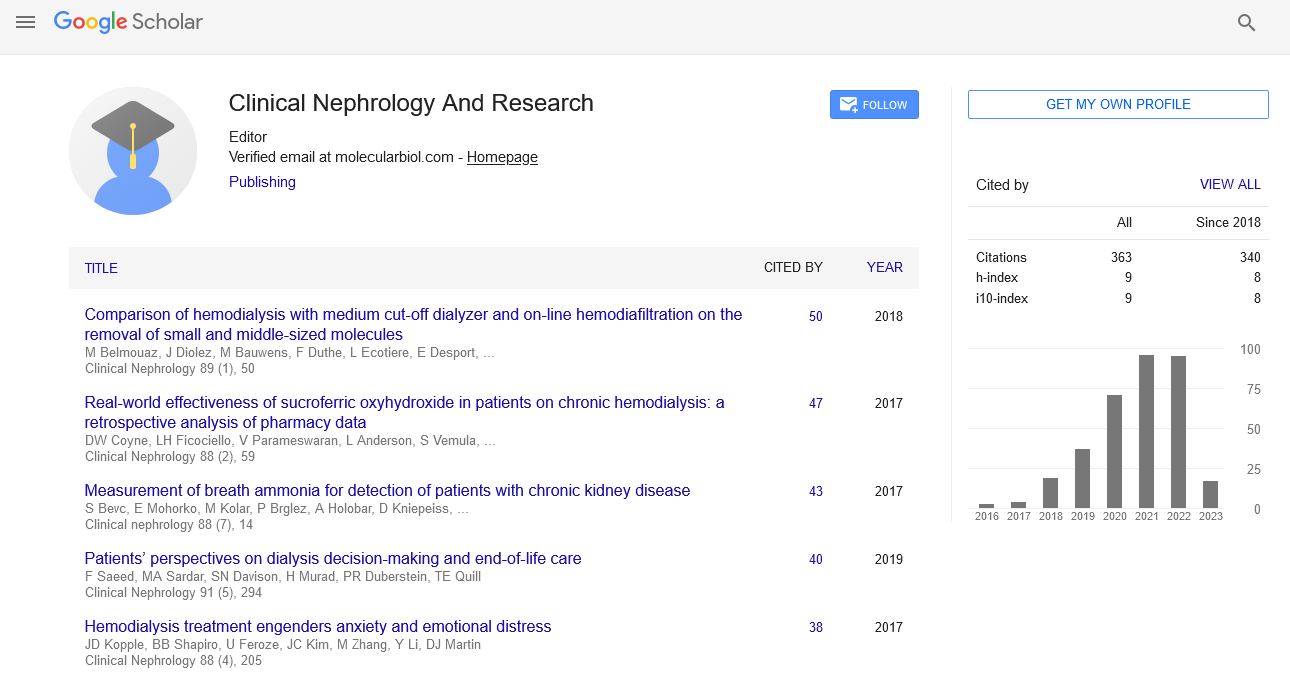Bringing Nephrology to the communities: Plugging global health gaps
Received: 13-Apr-2023, Manuscript No. PULCNR-24-6049 ; Editor assigned: 16-Apr-2024, Pre QC No. PULCNR-24-6049 (PQ); Reviewed: 30-Apr-2024 QC No. PULCNR-24-6049 (R); Revised: 17-Apr-2024, Manuscript No. PULCNR-24-6049 (R); Published: 24-Apr-2024
Citation: Fernandes E, Ghai G. Bringing nephrology to the communities: plugging global health gaps. Clin Nephrol Res 2023;7(1):1-2.
This open-access article is distributed under the terms of the Creative Commons Attribution Non-Commercial License (CC BY-NC) (http://creativecommons.org/licenses/by-nc/4.0/), which permits reuse, distribution and reproduction of the article, provided that the original work is properly cited and the reuse is restricted to noncommercial purposes. For commercial reuse, contact reprints@pulsus.com
Abstract
Kidney diseases today have posed a significant challenge to global health, and bridging the gulf of nephrology in community development calls for greater scientific diplomacy. Investing in treating Chronic Kidney Disease (CKD) is among the most pressing concerns of the 21st century, notwithstanding other kidney diseases. Convincing evidence suggests that simple laboratory tests can pick up CKD, complications can be deferred, the progression of the disease can be slowed, and other risk factors avoided. Effective governance by health ministries worldwide must translate the technological advances into shaping nephrology care at a community level by strengthening health systems at the grassroots.
Keywords
Chronic kidney disease; Global health diplomacy; Kidney health; Dialysis; Community healthcare
Introduction
Kidney diseases today have posed a significant challenge for global health and thus bridging the gulf of nephrology in community development calls for greater scientific diplomacy. Investing in treatment of Chronic Kidney Disease (CKD) is among the most pressing concerns of the 21st century notwithstanding other kidney diseases. Convincing evidence suggests that CKD can be picked up by simple laboratory tests, complications can be deferred, the progression of the disease can be slowed and other risk factors avoided. Effective governance by health ministries around the world must translate these technological advances into shaping nephrology care at a community level by strengthening health systems at primary and secondary level of care.
Historically, kidney diseases have been viewed from a prism of an ageing consequence rather than viewed from a lens of a preventable chronic disease. As CKD awareness among civilians is deeply lacking, sizeable government investment to improve kidney health at various levels of care becomes extremely crucial [1-3]. Stakeholders in nephrology, family medicine, critical care and public health need to move from a disease oriented focus on kidney ailments to a global health focus on improving kidney health, using the right choices of NSAIDs and preventing the progression of CKD as well.
Description
A public health policy to address kidney diseases, strengthen health systems and combat climate extremes: Kidney diseases no longer emerge in isolation but are heavily built on cascading risks and social, environmental and commercial determinants of healthcare. The link between chronic kidney disease and extreme heat-induced events is clearly emerging, which calls for a global public health policy that can shape nephrology’s future.
This link is observed in the steamy factories in Malaysia, the rice fields in Sri Lanka, and the Persian Gulf and Central America. Kidney diseases will continue to rise among laborers who work outdoors in the middle of higher temperature zones. In fact, the American Society of Nephrology stated that the incidence of kidney disease would increase with the confluence of socioeconomic factors that are constantly changing, and climate change risk factors with geographical zones.
Extreme weather events induced by climate change are leading to disasters that impact health systems, and during disasters, patients with CKD on dialysis or those who wish to go for routine check-ups get impacted as transportation gets affected [4,5]. When flood-induced power cuts occur in hospitals, dialysis can no longer be made functional until services resume. This must be looked into from a policy standpoint, and national disaster management plans must be accordingly amended so that access to care is not blocked due to climateinduced weather events [6].
Utilizing preventive medicine physicians and public health workforce for national and global health gains: Preventive health physicians can be exposed to a 1 year fellowship in nephrology care within institutional settings and at the community level, irrespective of whether they work in primary care units or at first referral units. Screening for serum creatinine levels in the community will help detect the burden of kidney disease early on.
Preventive medicine physicians or family medicine physicians can play a significant role in alleviating the burden of kidney diseases in the community setting, thereby reducing the burden on tertiary care institutions. They must also be trained in dialysis care and support so that surges at the tertiary care units will be reduced and patients do not have to travel for long hours.
It is also feasible for district health offices to roll out promotional initiatives for kidney care and increase awareness at local government levels pertaining to kidney health. Many low and middle income countries do not even practice low cost health promotional to support kidney health.
Dialysis facilities must be enhanced through stakeholder engagement and corporate support, and at the same time, kidney transplant must become more affordable with high precision. Involving preventive health physicians and the public health workforce to understand kidney transplant and the process, will build better community perception and patient reception towards informed outcomes.
An opportunity for global health diplomacy: For the first time in living memory, we experience that when the health of others around us is affected, our health is at stake. There has been a vacuum in the way this skill sets, mindset, approach, and experiences have been to provide care to patients with kidney disease. Nephrology in the global health domain has not been having serious conversations till now. Regional diplomacy and inter-ministerial meetings are yet to see nephrology as a point of conversation that can enable shared growth and sustainable investment. Low and middle income countries continue to be under-represented at the point of care and in terms of human resources available in setting the global health nephrology agenda. There is one nephrologist for 70,000 people in the US, and there is one nephrologist for 4 million people in Uganda [7,8]. This gives us a stark contrast how nephrologists are spaced in high and low income countries.
The opportunity for global health diplomacy to pursue is to create learning modules with public health and nephrology intersection that can mutually benefit countries through public health experience and shared clinical capabilities at medical schools. Bidirectional educational diplomacy to build career tracks in global health nephrology will lead to a more sustainable point of care and decrease the rising burden of kidney diseases.
Conclusion
Global diplomacy can also play a role in facilitating dialysis centers for patients with kidney diseases whose travel often gets restricted due to want for dialysis centers. Tertiary hospitals must be identified in every country and every major tourist location to cater to exclusively foreign tourists who may need dialysis when on travel. This can also be made available through prior appointments to reduce waiting time. This will become a meaningful policy level intervention to build diplomatic relations for countries, promote tourism for those with ailments and those who need care, and ensure sustainable happiness, putting humans at the heart of solutions.
Conflict of Interest
Nil.
References
- Vanholder R, Annemans L, Bello AK, et al. Fighting the unbearable lightness of neglecting kidney health: The decade of the kidney. Clin Kidney J. 2021;14(7):1719-30.
- van Dipten C, de Grauw WJ, Wetzels JF, et al. What patients with mild to moderate kidney disease know, think, and feel about their disease: An in-depth interview study. J Am Board Fam Med. 2018;31(4):570-77.
[Crossref] [Google Scholar][PubMed]
- Neale EP, Middleton J, Lambert K, et al. Barriers and enablers to detection and management of chronic kidney disease in primary healthcare: A systematic review. BMC Nephrology. 2020; 21(1):1-7.
- Fernandes E, Zodpey S. India requires a public health law for disaster resilience. Int J Health Allied Sci. 2019;8(3):214.
- Fernandes E, Borah H, Shetty S. Mainstream disaster health as a policy priority: Experiences from Chennai floods and a cross-sectional study during disaster relief phase. Int J Community Med Public Heal. 2016;3(6):1589-92.
- UNESCAP. Resilience in a riskier world: Managing systemic risks from biological and other natural hazards. Economic and Social Commision for Asia and the Pacific (ESCAP). 2021.
- Kalyesubula R, Makanga G, Gyagenda JO, et al. Nephrology in Uganda. Nephrol worldwide. 2021:75-83.
- Bello AK, Levin A, Tonelli M, et al. Assessment of global kidney health care status. Jama. 2017;317(18):1864-81.
[Crossref] [Google Scholar][PubMed]





